- Home
- Franz Kafka
The Trial: A New Translation Based on the Restored Text Page 5
The Trial: A New Translation Based on the Restored Text Read online
Page 5
When he grew tired of looking out onto the empty street, he lay down on the divan, having opened the door to the hall slightly so that he could see anyone entering the lodgings directly from where he was lying. He lay on the divan smoking a cigar until around eleven. After that he couldn’t hold out there any longer, and went instead out into the hall for a little while, as if he could speed up Fräulein Bürstner’s arrival that way. He had no particular desire to see her, he couldn’t even quite remember what she looked like, but now he wanted to talk to her, and he was annoyed that by coming home so late she was bringing disturbance and disarray to this day’s end as well. And it was her fault he hadn’t eaten anything that evening, and that he’d skipped his intended visit to Elsa that day. Of course, he could make up for both now by going to the wine bar where Elsa worked. He’d do that later, after he had spoken with Fräulein Bürstner.
It was past eleven-thirty when he heard someone on the stairs. K., who had been pacing up and down the hall noisily, lost in thought, as if he were in his own room, fled behind his door. It was Fräulein Bürstner, returning. Shivering, she pulled a silk shawl around her slim shoulders as she locked the door. In another moment she would be entering her room, which K. certainly wouldn’t be permitted to invade this close to midnight; he had to speak to her now, but unfortunately he’d forgotten to switch on the light in his room, so that when he stepped out of the darkened room it would resemble an assault, and at the very least would give her a real shock. At a loss, and since there was no time to lose, he whispered through the crack in the door: “Fräulein Bürstner.” It sounded like a plea, not a call. “Is someone there?” asked Fräulein Bürstner and looked around wide-eyed. “It’s me,” said K., and stepped forward. “Oh, Herr K.!” said Fräulein Bürstner with a smile; “Good evening,” and she held out her hand. “I wanted to have a few words with you, may I do so now?” “Now?” asked Fräulein Bürstner; “does it have to be now? Isn’t that a little unusual?” “I’ve been waiting for you since nine o’clock.” “Well, I was at the theater, I had no idea you were waiting.” “What I wanted to talk to you about was occasioned by something that occurred just today.” “Well, I really don’t mind, except that I’m so tired I’m about to drop. Come into my room for a few minutes then. We certainly can’t talk here, we’ll wake everyone up, and that would be even more unpleasant for us than for the others. Wait here until I’ve lit the lamp in my room and then turn this light off.” K. did so but then remained waiting until Fräulein Bürstner softly invited him in again from her room. “Sit down,” she said, and pointed toward the ottoman, while she herself remained standing by the bedpost, in spite of her talk of fatigue; she didn’t even take off her small hat, which overflowed with flowers. “So what is it you want? I’m really curious.” She crossed her legs lightly. “Perhaps you’ll say,” K. began, “that the matter wasn’t so pressing that we had to talk about it now, but—” “I never listen to long preliminaries,” said Fräulein Bürstner. “That makes my task easier,” said K. “Your room was slightly disturbed today, and in a sense it was my fault; it was done by strangers and against my will, and yet, as I say, it was my fault; that’s what I wanted to ask your pardon for.” “My room?” asked Fräulein Brüstner, scrutinizing K. instead of the room. “That’s right,” said K. and now they both looked each other in the eyes for the first time, “exactly how it happened isn’t worth talking about.” “But that’s what’s really interesting,” said Fräulein Bürstner. “No,” said K. “Well,” said Fräulein Bürstner, “I don’t want to pry into secrets; if you claim it’s of no interest, I won’t bother to argue. I gladly grant the pardon you seek, particularly since I see no trace of any disorder.” She made a tour of the room, her hands flat and low on her hips. She stopped in front of the mat with the photographs. “Yes, look,” she cried out, “my photos have been all mixed up. That’s really annoying. Someone’s been in my room without permission.” K. nodded and silently cursed the clerk Kaminer, who could never control his stupid, senseless fidgeting. “I find it odd,” said Fräulein Bürstner, “to be forced to forbid you to do something your own conscience should forbid, namely, to enter my room when I’m away.” “But I explained to you, Fräulein,” said K., going over to the photographs as well, “I’m not the one who took liberties with your photographs; but since you don’t believe me, I must confess that the commission of inquiry brought along three bank clerks, and that one of them, whom I’ll have dismissed from the bank at the first opportunity, probably handled your photographs.” “Yes, there was a commission of inquiry here,” K. added, since the young woman was staring at him with a questioning look. “Because of you?” the young woman asked. “Yes,” K. replied. “No,” the young woman cried with a laugh. “Oh, yes,” said K. “Do you think I’m guiltless then?” “Well, guiltless …,” said the young woman, “I don’t want to make a hasty judgment that might possibly have serious consequences, and I don’t really know you, but it does seem that you’d have to be a serious criminal to have a commission of inquiry come down on you right from the start. But since you’re free—at least I gather from your calm state that you haven’t escaped from prison—you can’t have committed any serious crime.” “Yes,” said K., “but it may have been that the commission of inquiry realized I’m guiltless or at least not quite as guilty as they thought.” “Yes, that could be,” said Fräulein Bürstner, paying close attention. “You see,” said K., “you don’t have much experience in court matters.” “No, I don’t,” said Fräulein Bürstner, “and I’ve often regretted that, because I would like to know everything, and I’m fascinated with court matters. The court has a strange attraction, doesn’t it? But I’ll certainly be able to increase my knowledge in that area, because I start next month as a secretary in a law firm.” “That’s very good,” said K., “then you’ll be able to help me a little with my trial.” “Perhaps,” said Fräulein Bürstner, “why not? I enjoy using my knowledge.” “I’m serious too,” said K., “or at least half serious, like you. It’s too minor an affair to bring in a lawyer, but I could use someone to advise me.” “Yes, but if I’m to advise you, I have to know what it’s all about,” said Fräulein Bürstner. “That’s just the problem,” said K., “I don’t know myself.” “Then you’ve just been teasing me,” said Fräulein Bürstner, exceedingly disappointed, “you hardly needed to pick such a late hour to do it.” And she walked away from the photographs, where they had been standing together for so long. “But Fräulein,” K. said, “I’m not teasing. Why won’t you believe me? I’ve already told you everything I know. More than I know in fact, because it wasn’t a commission of inquiry. I just called it that because I don’t know any other name for it. There was no inquiry, I was simply arrested, but by a commission.” Fräulein Bürstner sat down on her ottoman and laughed again: “What was it like?” she asked. “Terrible,” said K., although now he wasn’t thinking about it at all, but was instead totally engrossed by the sight of Fräulein Bürstner, who was resting her head on one hand—her elbow propped on the cushion of the ottoman—while she slowly stroked her hip with the other. “That’s too general,” said Fräulein Bürstner. “What’s too general?” K. asked. Then he came to himself and asked: “Do you want me to show you how it was?” He wanted to move about and yet not leave. “I’m already tired,” said Fräulein Bürstner. “You got in so late,” said K. “And now it ends with reproaches; I deserve it, I should never have let you in. And it wasn’t really necessary, as it turned out.” “It was necessary, you’ll see that now,” said K. “May I move the nightstand away from your bed?” “What an idea!” said Fräulein Bürstner; “of course you can’t!” “Then I can’t show you,” K. said, all upset, as if this would cause him immense harm. “Well, if you need it for your performance, then go ahead and move the stand,” said Fräulein Bürstner, adding in a faint voice, after a pause: “I’m so tired that I’m letting you take more liberties than I should.” K. placed the little table in the middle of the room and sat down be
hind it. “You have to visualize the cast of characters, it’s very interesting. I’m the inspector, two guards are sitting over there on the chest, three young men are standing by the photographs. From the window handle, I’m just noting it in passing, hangs a white blouse. And now the action begins. Oh, I’m forgetting myself, the most important character: I’m standing here, in front of the table. The inspector is sitting totally at ease, his legs crossed, his arm hanging down like this from the back of the chair, an unbelievable boor. And now the action really begins. The inspector cries out as if he has to wake me up, practically shouting; unfortunately I’ll have to shout too, to show you how it was; all he shouts is my name, by the way.” Fräulein Bürstner, laughing as she listened, held her finger to her lips to keep K. from yelling, but it was too late, K. had entered too deeply into his role: “Josef K.!” he cried, drawing it out slowly, not, after all, as loudly as he had threatened, yet in such a way that the cry, having suddenly burst forth, seemed to spread only gradually throughout the room.
There was a knock at the door to the adjoining room, a brief, loud series of blows. Fräulein Bürstner turned pale and put her hand to her heart. The shock was even greater for K., since for a short while he could think of nothing but that morning’s events and the young woman he was reenacting them for. As soon as he came to himself he sprang to Fräulein Bürstner and took her hand. “Don’t worry,” he whispered, “I’ll straighten everything out. But who can it be? That’s just the living room next door, and no one’s sleeping there.” “Oh, yes,” Fräulein Bürstner whispered in K.’s ear, “Frau Grubach’s nephew has been staying there since yesterday, a captain. There’s no other room free at the moment. I’d forgotten about it too. You had to shout so! That makes me very unhappy.” “There’s no reason to be,” said K. and kissed her on the forehead as she sank back upon the cushion. “Go, go,” she said, and quickly straightened up again, “go on, go away. What do you want, he’s listening at the door, he can hear everything. You’re tormenting me!” “I’m not going,” said K., “until you’ve calmed down a bit. Come over to the other corner of the room; he can’t hear us there.” She let him lead her there. “Just remember,” he said, “this may be unpleasant for you, but you’re in no danger. You know how Frau Grubach, whose voice will count most, particularly since the captain is her nephew, practically worships me, and believes anything I say. She’s beholden to me in another way too, since she’s borrowed a large sum from me. I’ll accept any suggestion you offer as to why we were together, as long as it’s halfway reasonable, and I guarantee I’ll get Frau Grubach not only to accept it in public, but to truly and honestly believe it. You needn’t spare me in any way. If you want it spread around that I assaulted you, that’s what Frau Grubach will be told and what she will believe, without losing confidence in me, that’s how devoted she is to me.” Fräulein Bürstner stared silently at the floor in front of her, slumping slightly. “Why shouldn’t Frau Grubach believe that I assaulted you,” K. added. He saw before him her hair, parted, tightly drawn reddish hair, gathered together lightly on her neck. He thought she would look up at him, but she spoke without changing her posture: “Pardon me, it was the sudden knocking that frightened me, not so much the possible consequences of the captain’s presence. It was so quiet after you cried out, and then the knocking came, that’s why I was so frightened, and I was sitting so close to the door, the knocking was right beside me. I appreciate your suggestions, but I can’t accept them. I can take full responsibility for what happens in my room and face anyone. I’m surprised you don’t realize the insult to me implicit in your suggestions, along, of course, with your good intentions, which I certainly recognize. But go now, leave me to myself, I need that more than ever now. The few minutes you requested have turned into more than half an hour.” K. seized her by the hand and then by the wrist: “You’re not mad at me, are you?” he said. She pushed his hand away and answered: “No, no, I never get angry at anyone.” He reached for her wrist again, she allowed it now and led him to the door. He firmly intended to leave. But at the door, as if he hadn’t expected to find one there, he hesitated; Fräulein Bürstner used this moment to free herself, open the door, slip into the hall, and implore K. softly from there: “Now come on, please. Look”—she pointed at the captain’s door, beneath which a strip of light emerged—“his light is on and he’s amusing himself over us.” “I’m coming,” said K., rushed out, seized her, kissed her on the mouth, then all over her face, like a thirsty animal lapping greedily at a spring it has found at last. Then he kissed her on the neck, right at her throat, and left his lips there for a long time. A noise from the captain’s room caused him to look up. “I’ll go now,” he said; he wanted to call Fräulein Bürstner by her given name, but he didn’t know it. She nodded wearily, allowed him to take her hand for a kiss as she was already half turned away, as if she were unaware of it, and entered her room with bowed head. Shortly thereafter K. lay in his bed. He fell asleep very quickly; before falling asleep he reflected briefly on his conduct: he was pleased with it, but was surprised that he didn’t feel even more pleased; he was seriously concerned on Fräulein Bürstner’s behalf because of the captain.
INITIAL INQUIRY
K. was informed by telephone that a small inquiry into his affair would take place the following Sunday. He was notified that such inquiries would now be held on a regular basis, perhaps not every week, but with some frequency. On the one hand, it was in the general interest to bring his trial to a rapid conclusion; on the other, the inquiries must be thorough in every respect, yet never last too long, due to the strain involved. Therefore they had selected the expedient of this succession of closely spaced but brief inquiries. Sundays had been chosen for the inquiries to avoid disturbing K.’s professional life. It was assumed he would find this acceptable; if he preferred some other fixed time, they would try their best to accommodate him. For example the inquiries could be held at night, but K. probably wouldn’t be fresh enough then. At any rate, as long as K. had no objection, they would stay with Sundays. Of course he was required to appear; they presumed it was not really necessary to point that out. He was given the number of the building in which he was to appear: it was a building on a street in a distant district K. had never been to before.
Having received this message, K. hung up the phone without replying; he had resolved at once to go on Sunday; it was clearly necessary, the trial was getting under way and he had to put up a fight; this initial inquiry must also be the last. He was still standing lost in thought by the phone when he heard the voice of the executive vice president behind him, who wanted to make a phone call, but found K. blocking the way. “Bad news?” the vice president asked lightly, not because he wanted to know, but to get K. away from the phone. “No, no,” said K., stepping aside but not walking off. The vice president picked up the phone and, while waiting to be put through, spoke across the receiver: “May I ask you something, Herr K.? Will you do me the pleasure of coming to a party on my sailboat Sunday morning? There’ll be quite a few people, I’m sure you’ll know some of them. Among others Hasterer, the public prosecutor. Would you like to come? Please do!” K. tried to concentrate on what the vice president was saying. It was not without importance for him, since this invitation from the vice president, with whom he had never got along particularly well, indicated an attempt at reconciliation on the other’s part, and showed how important K. had become to the bank, and how valuable his friendship, or at least his neutrality, must seem to the bank’s second-highest officer. The invitation humbled the vice president, even if it had merely been delivered across the receiver while waiting for a call to go through. But K. was forced to humble him a second time by replying: “Thank you very much! But unfortunately I’m busy on Sunday, I have a previous engagement.” “Too bad,” the vice president said, and returned to his call, which had just been put through. It was no brief conversation, but in his preoccupied state K. remained standing by the phone the whole time. It wasn’t until
the vice president hung up that he came to himself with a start and said, to excuse himself somewhat for having simply stood around, “I just received a call asking me to go somewhere, but they forgot to tell me the time.” “Call them back and ask,” said the vice president. “It’s not that important,” said K., although in doing so his previous excuse, which was already weak enough, crumbled even further. As they walked away the vice president talked of other things, and K. forced himself to answer, but he was really thinking that it would be best to arrive Sunday morning at nine, since that was when courts opened session on workdays.
The weather was dull on Sunday, and K. was very tired, having stayed at the tavern celebrating with the regulars late into the night, so that he almost overslept. He dressed hastily, without having time to think things over or review the various plans he’d worked out during the week, and skipping breakfast, hurried to the suburb they had indicated. Strangely enough, although he had little time to look about, he ran across the three clerks who were involved in his affair: Rabensteiner, Kullych, and Kaminer. The first two were riding in a tram that crossed K.’s path, but Kaminer was sitting on the terrace of a coffeehouse and, just as K. was walking by, leaned inquisitively over the railing. They probably all gazed after him, wondering why their supervisor was in such a rush; some sort of stubbornness had prevented K. from taking a cab; he had an aversion to even the slightest outside help in this affair of his; he didn’t want to enlist anyone’s aid and thus initiate them in the matter even distantly; nor, finally, did he have the least desire to humble himself before the commission of inquiry by being overly punctual. Of course he was now running to get there by nine if at all possible, although he had not even been given a specific hour at which to appear.

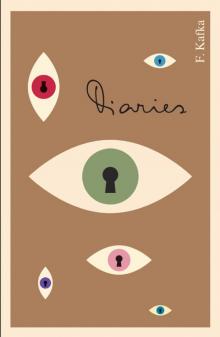 Diaries of Franz Kafka
Diaries of Franz Kafka Metamorphosis and Other Stories
Metamorphosis and Other Stories The Castle: A New Translation Based on the Restored Text
The Castle: A New Translation Based on the Restored Text The Complete Stories
The Complete Stories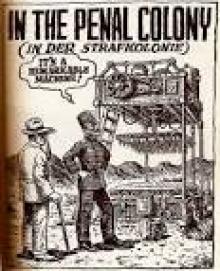 In the Penal Colony
In the Penal Colony The Trial
The Trial Amerika
Amerika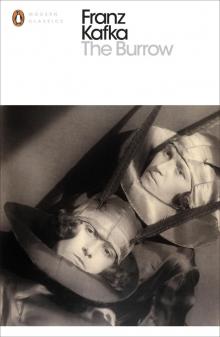 The Burrow: Posthumously Published Short Fiction
The Burrow: Posthumously Published Short Fiction Sons
Sons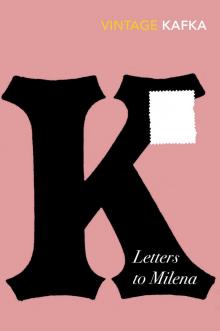 Letters to Milena
Letters to Milena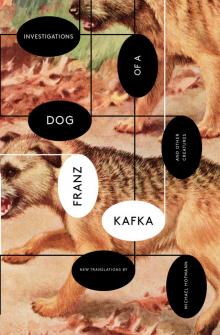 Investigations of a Dog: And Other Creatures
Investigations of a Dog: And Other Creatures Collected Stories
Collected Stories The Great Wall of China
The Great Wall of China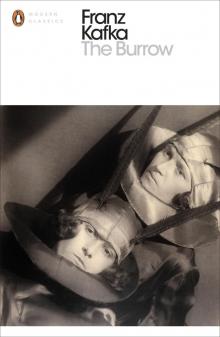 The Burrow
The Burrow The Castle
The Castle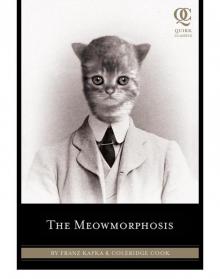 The Meowmorphosis
The Meowmorphosis The Sons
The Sons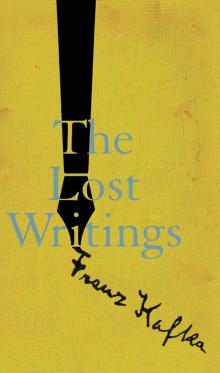 The Lost Writings
The Lost Writings The Unhappiness of Being a Single Man
The Unhappiness of Being a Single Man Amerika: The Missing Person: A New Translation, Based on the Restored Text
Amerika: The Missing Person: A New Translation, Based on the Restored Text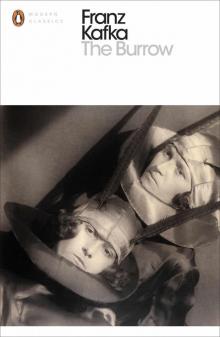 The Burrow: Posthumously Published Short Fiction (Penguin Modern Classics)
The Burrow: Posthumously Published Short Fiction (Penguin Modern Classics)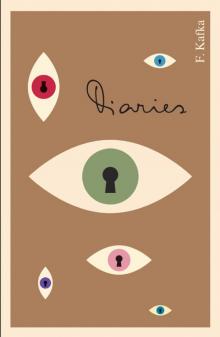 The Diaries of Franz Kafka
The Diaries of Franz Kafka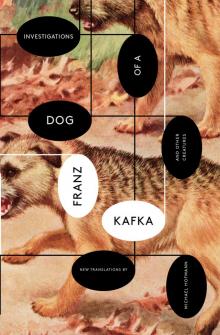 Investigations of a Dog
Investigations of a Dog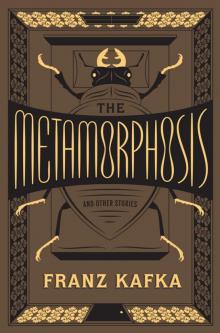 The Metamorphosis and Other Stories
The Metamorphosis and Other Stories The Trial: A New Translation Based on the Restored Text
The Trial: A New Translation Based on the Restored Text